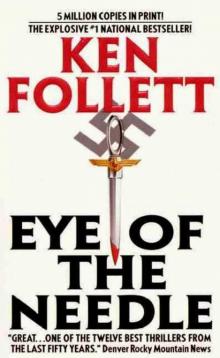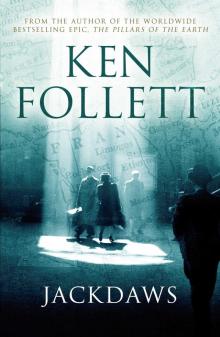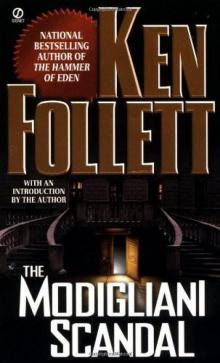- Home
- Ken Follett
Storm Island Page 9
Storm Island Read online
Page 9
again.
There was only one door at the top of the second flight of stairs.
Faber tried it gently. It was locked.
He took another tool from the pocket of his jacket. The noise of the
cistern filling covered the sound of Faber picking the lock. He opened
the door and listened.
He could hear deep, regular breathing. He stepped inside. The sound
came from the opposite corner of the room. He could see nothing. He
crossed the pitch-black room very slowly, feeling the air in front of
him at each step, until he was beside the bed.
He had the torch in his left hand, the stiletto loose in his sleeve,
and his right hand free. He switched on the torch and grabbed the
sleeping man's throat in a strangling grip.
The agent's eyes snapped open, full of fear, but he could make no
sound. Faber straddled the bed and sat on him.
6?
Then he whispered: "One Kings thirteen and relaxed his grip' You the
agent said. He peered into the torchlight, trying to see Faber's face.
He rubbed his neck where Faber's hand had squeezed.
Faber hissed: "Be still!" He shone the torch into the agent's eyes,
and with his right hand drew the stiletto.
"Aren't you going to let me get up?"
"I prefer you in bed where you can do no more damage."
"Damage? More damage?"
"You were watched in Leicester Square, you let me follow you here, and
they are observing this house. Should I trust you to do anything?"
"My God, I'm sorry."
"Why did they send you?"
"The message had to be delivered personally. The orders come from the
Fuhrer himself." The agent stopped.
"Well? What orders?"
"I... have to be sure it is you."
"How can you be sure?"
"I must see your face."
Faber hesitated, then shone the torch at himself briefly.
"Satisfied?"
"Die Nadel," the man breathed.
"And who are you?"
"Major Friedrich Kaldor, at your service, sir."
"Then I should call you Sir."
"Oh, no, sir. You've been promoted twice in your absence. You are now
a lieutenant-colonel."
"Have they nothing better to do in Hamburg?"
"Aren't you pleased?"
"I should be pleased to go back and put Major von Braun on latrine
duty."
"May I get up, sir?"
"Certainly not. What if Major Kaldor is languishing in Wandsworth
Jail, and you are a substitute, just waiting to give some kind of
signal to your watching friends in the house opposite?"
"Very well."
"So what are these orders from Hitler himself?"
"Well, sir, the Reich believes there will be an invasion of France this
year."
"Brilliant, brilliant. Go on."
"They believe that General Patton is massing the First United States
Army Group in the part of England known as East Anglia. If that army
is the invasion force, then it follows that they will attack via the
Pas de Calais."
"That makes sense. But I have seen no sign of this army of
Patton's."
"There is some doubt in the highest circles in Berlin. The Fuhrer's
astrologer ' "What?"
"Yes, sir, he has an astrologer, who tells him to defend Normandy."
"My God. Are things that bad there?"
"He gets plenty of earthbound advice, too. I personally believe he
uses the astrologer as an excuse when he thinks the generals are wrong
but he cannot fault their arguments."
Faber sighed. He had been afraid of news like this.
"Go on."
"Your assignment is to assess the strength of FUSAG: numbers of troops,
artillery, air support ' "I know how to measure armies, thank you."
"Of course." He paused.
"I am instructed to emphasize the importance of the mission, sir."
"And you have done so. Tell me: are things that bad in Berlin?"
The agent hesitated, and said: "No, sir. Morale is high, output of
munitions increases every month, the people spit at the bombers of the
R.A.F ' "Never mind," Faber interrupted him.
"I can get the propaganda from my radio."
The younger man was silent.
Faber said: "Do you have anything else to tell me? Officially, I
mean."
"Yes. For the duration of the assignment you have a special bolt
hole
"They do think it's important," Faber said.
"You rendezvous with a U-boat in the North Sea, ten miles due east of
a town called Aberdeen. Just call them in on your normal radio
frequency and they will surface. As soon as you or I have told Hamburg
that the orders have been passed from me to you, the route will be
open. The boat will be there every Friday and Monday at six p.m. and
will wait until six a.m."
"Aberdeen is a big town. Do you have an exact map reference?"
"Yes." The agent recited the numbers, and Faber memorized them.
"Is that everything, Major?"
"Yes, sir."
What do you plan to do about the gentlemen from Ml5 in the house across
the road?"
The agent shrugged.
"I shall have to give them the slip."
Faber thought: It's no good.
"What are your orders for action after you have seen me? Do you have a
bolt hole
"No. I am to go to a place called Weymouth and steal a boat in which
to return to France."
That was no plan at all. So, Faber thought: Canaris knew how it would
be. Very well.
He said: "And if you are caught by the British, and tortured?"
"I have a suicide pill."
"And you will use it?"
"Most certainly."
Faber looked at him.
"I think you might," he said. He placed his left hand on the agent's
chest and put his weight on it, as if he were about to get off the bed.
That way he was able to feel exactly where the rib cage ended and the
soft belly began. He thrust the point of the stiletto in just under
the ribs and stabbed upward to the heart.
The agent's eyes widened for a terror-stricken instant. A cry came to
his throat but did not escape. His body convulsed. Faber pushed the
stiletto an inch farther in. The eyes closed and the body went Limp.
Faber said: "You saw my face."
EIGHT
"I think we've lost control of it," said Percival Godliman.
Frederick Bloggs nodded agreement, and added: "It's my fault."
The boy looked weary, Godliman thought. He had had that look for
almost a year, ever since the night they dragged the crushed remains of
his wife from underneath the rubble of their bombed house in Hoxton.
Tin not interested in apportioning blame," Godliman said briskly.
"The fact is that something happened in Leicester Square those few
seconds when you lost sight of Blondie."
"Do you think the contact was made?"
"Possibly."
"When we picked him up again back in Stockwell, I thought he had simply
given up for the day."
"If that were the case he would have made the rendezvous again
yesterday and today." Godliman was making patterns with matchsticks on
his desk, an aid to thinking he had developed into a ha
bit.
"Still no movement at the house?"
"Nothing. He's been in there for forty-eight hours." Bloggs repeated:
"It's my fault."
"Don't be a bore, old chap," Godliman said.
"It was my decision to let him run, so that he would lead us to someone
else; and I still think it was the right move."
Bloggs sat motionless, his expression blank, his hands in the pockets
of his raincoat.
"If the contact has been made, we shouldn't delay picking Blondie up
and finding out what his mission was."
"That way we lose whatever chance we have of following Blondie to
somebody really dangerous."
"Your decision."
Godliman had made a church with his matches. He stared at it for a
moment, then took a halfpenny from his pocket and tossed it.
"Tails," he observed.
"Give him another twenty-four hours."
The landlord was a middle-aged Irish Republican from Lis-doonvarna,
County Clare, who harboured a secret hope that the Germans would win
the war and thus free the Emerald Isle from English oppression forever.
He limped arthritically around the old house, collecting his weekly
rents, thinking how much he would be worth if those rents were allowed
to rise to their true market value. He was not a rich man he owned
only two houses, this and the smaller one in which he lived. He was
permanently bad-tempered.
On the first floor he tapped on the door of the old man. This tenant
was always pleased to see him. He was probably pleased to see anybody.
He said: "Hello, Mr. Riley, would you like a cup of tea ?"
"No time today."
"Oh, well." The old man handed over the money.
"I expect you've seen the kitchen window."
"No, I didn't go in there."
"Oh! Well, there's a pane of glass out. I patched it over with
blackout curtain, but of course there is a draught."
"Who smashed it?" the landlord asked.
"Funny thing, it ain't broke. Just lying there on the grass. I expect
the old putty just gave way. I'll mend it myself, if you can get hold
of a bit of putty."
You old fool, the landlord thought. Aloud he said: "I don't suppose it
occurred to you that you might have been burgled ?"
The old man looked astonished.
"I never thought of that."
"Nobody's missing any valuables?"
"Nobody's said so to me."
The landlord went to the door.
"All right, I'll have a look when I go down."
The old man followed him out.
"I don't think the new bloke is in, upstairs," he said.
"I haven't heard a sound for a couple of days."
The landlord was sniffing.
"Has he been cooking in his room?"
"I wouldn't know, Mr. Riley."
The two of them went up the stairs. The old man said: "He's very
quiet, if he is in there."
"Whatever he's cooking, hell have to stop. It smells bloody awful."
The landlord knocked on the door. There was no answer. He opened it
and went in, and the old man followed him.
"Well, well, well," the old sergeant said heartily.
"I think you've got a dead one."
He stood in the doorway, surveying the room.
"You touched anything, Paddy?"
"No," the landlord replied.
"And the name's Mr. Riley."
The policeman ignored this.
"Not long dead, though. I've smelled worse." His survey took in the
old chest of drawers, the suitcase on the low table, the faded square
of carpet, the dirty curtains on the dormer window, and the rumpled bed
in the corner. There were no signs of a struggle.
He went over to the bed. The young man's face was peaceful, his hands
clasped over his chest.
"I'd say heart attack, if he wasn't so young." There was no empty
sleeping-pill bottle to indicate suicide. He picked up the leather
wallet on top of the chest and looked through its contents. There was
an identity card and a ration book, and a fairly thick wad of notes.
"Papers in order and he ain't been robbed."
"He's only been here a week or so," the landlord ventured.
"I don't know much about him at all. He came from North Wales to work
in a factory."
The sergeant observed: "If he was as healthy as he looked he'd be in
the Army." He opened the suitcase on the table.
"Bloody hell, what's this lot?"
The landlord and the old man had edged their way into the room now. The
landlord said: "It's a radio' at the same time as the old man said:
"He's bleeding."
"Don't touch that body!" the sergeant said.
"He's had a knife in the guts," the old man persisted.
The sergeant gingerly lifted one of the dead hands from the chest to
reveal a small patch of dried blood.
"He was bleeding," he said.
"Where's the nearest phone?"
"Five doors down," the landlord told him.
"Lock this room and stay out until I get back."
The sergeant left the house and knocked at the door of the neighbour
with the phone. A woman opened it.
"Good morning, madam. May I use your telephone?"
"Come in." She showed him the phone, on a stand in the hall.
"What's happened anything exciting?"
"A tenant died in a lodging-house just up the road," he told her as he
dialled.
"Murdered?" she asked, wide-eyed.
"I leave that to the experts. Hello? Superintendent Jones, please.
This is Canter." He looked at the woman.
"Might I ask you just to pop in the kitchen while I talk to my
governor?"
She went, disappointed.
"Hello, Super. This body's got a knife wound and a suitcase radio."
"What's the address again, Sarge?"
Sergeant Canter told him.
"Yes, that's the one they've been watching. This is an MI5 job, Sarge.
Go to number forty-two and tell the surveillance team what you've
found. I'll get on to their chief. Off you go."
Canter thanked the woman and crossed the road. He was quite thrilled:
this was only his second murder in 31 years as a Metropolitan
Policeman, and it turned out to involve espionage ! He might make
Inspector yet.
He knocked on the door of number forty-two. It opened, and two men
stood there.
Sergeant Canter said: "Are you the secret agents from Mis?"
Bloggs arrived at the same time as a Special Branch man,
Detective-Inspector Harris, whom he had known in his Scotland Yard
days. Canter showed them the body.
They stood still for a moment, looking at the peaceful young face with
its blond moustache.
Harris said: "Who is he?"
"Codename Blondie," Bloggs told him.
"We think he came in by parachute a couple of weeks ago. We picked up
a radio message to another agent arranging a rendezvous. We knew the
code, so we were able to watch the rendezvous. We hoped Blondie would
lead us to the resident agent, who would be a much more dangerous
specimen."
"So what happened here?"
"Buggered if I know."
Harris looked at the wound in the agent's chest.
"Stiletto?"
"Something like
that. A very neat job. Under the ribs and straight up
into the heart. Quick."
"There are worse ways to die."
Sergeant Canter said: "Would you like to see the method of entry?"

 The Pillars of the Earth
The Pillars of the Earth Eye Of The Needle
Eye Of The Needle Lie Down With Lions
Lie Down With Lions Winter of the World
Winter of the World Triple
Triple World Without End
World Without End Fall of Giants
Fall of Giants Jackdaws
Jackdaws Hornet Flight
Hornet Flight Whiteout
Whiteout A Dangerous Fortune
A Dangerous Fortune The Man From St. Petersburg
The Man From St. Petersburg A Column of Fire
A Column of Fire The Hammer of Eden
The Hammer of Eden On Wings of Eagles
On Wings of Eagles The Evening and the Morning
The Evening and the Morning The Key to Rebecca
The Key to Rebecca Code to Zero
Code to Zero Paper Money
Paper Money A Place Called Freedom
A Place Called Freedom The Modigliani Scandal
The Modigliani Scandal Triple (1991)
Triple (1991) A Dangerous Fortune (1994)
A Dangerous Fortune (1994) A Place Called Freedom (1995)
A Place Called Freedom (1995) Winter of the World (Century Trilogy 2)
Winter of the World (Century Trilogy 2) Code to Zero (2000)
Code to Zero (2000) On Wings Of Eagles (1990)
On Wings Of Eagles (1990) Storm Island
Storm Island Fall of Giants (The Century Trilogy)
Fall of Giants (The Century Trilogy) the Third Twin (1996)
the Third Twin (1996) The Modigliani Scandal (1976)
The Modigliani Scandal (1976) Night Over Water
Night Over Water